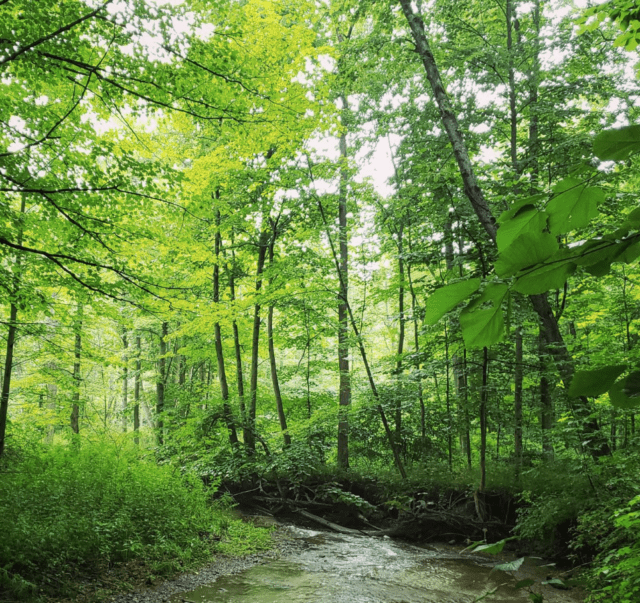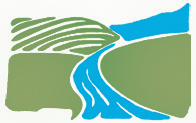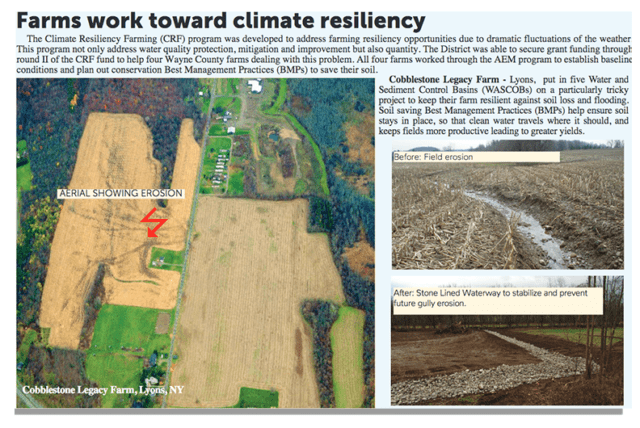Are you ready? The 2025 Wayne County Envirothon will be held at the Montezuma Audubon Center on Thursday April 27th. Envirothon is an annual competition in which teams compete by demonstrating their knowledge of environmental science and natural resource management. Teams, each consisting of five students from schools, home study groups and environmental clubs, exercise their training and problem-solving skills in a competition centered on five testing categories: Soils/Land Use, Aquatic Ecology, Forestry, Wildlife, and Current Environmental Issues.
Free Seedlings Available to Qualified Landowners

Photo Courtesy NYS DEC
NYSDEC recently announced that the application period for the ‘Trees for Tribs’ “Buffer in a Bag” Program is now open. Qualifying private and public landowners may apply for a free bag of 25 tree and shrub seedlings for planting near streams, rivers, or lakes to help stabilize banks, protect water quality, and improve wildlife habitat.
DEC’s Trees for Tribs Buffer in a Bag program provides free tree and shrub seedlings for organizations and private landowners to create or improve stream buffers on their property. The seedlings are available to qualified landowners for streamside plantings under DEC Buffer in a Bag Program Learn more at https://www.dec.ny.gov/animals/77710.html#Bag
Riparian buffers are strips of vegetation (trees, shrubs or grass) planted next to streams or other waterbodies. By planting vegetation along streams, space is created between the water and upland land uses, which helps protect the water quality and stream habitat. To qualify, landowners must have property in New York State with at least 50 feet bordering a stream, river, or lake, and provide photos or a map of the planting location.
Previous recipients are encouraged to reapply to continue to build riparian buffers. Applicants are eligible for one bag of 25 seedlings and recipients are chosen on a first-come, first-served basis. A total of 350 bags will be available statewide for this round of applications. The 2023 Buffer in a Bag program, application requirements, and the April 7 deadline. Applications are due by 3 p.m.
These mighty waterside plants start out small, but their impacts are huge:
🌱 They help reduce pollution from entering waterways
🌱 They absorb rain during storms, which slows flooding
🌱 Their roots hold soil in place, which prevents erosion
🌱 The provide wildlife habitat both on land and in the water
🌱 They provide shade, which cools water temperatures and protects native fish
🌱 They absorb and store carbon dioxide, which helps combat climate change
Contact treesfortribs@dec.ny.gov with questions and visit DEC’s Trees for Tribs webpage to learn more.
Climate Resilient Farming Grant Program
$28.5M will be provided through the Climate Resilient Farming Grant Program and the Agricultural Non-Point Source Abatement and Control Program
Climate Resilient Farming Grant Program helps farms reduce their operational impact on the environment and address the impacts of extreme weather events resulting from climate change. This is Round 7. The program offers $15 million and up from $8 million in the last round of the program. The program is designed to help farmers implement agricultural projects and make related equipment purchases that reduce greenhouse gas emissions, and support soil health and improved water quality. Projects will also help agricultural producers prepare for and better manage impacts of climate change, including increased heavy storm events, overall rainfall, and periods of drought.
According to NYS Ag and Markets, this year’s program emphasizes precision feed management and agroforestry, two best management practices that are identified in the New York State Climate Action Council’s Scoping Plan as critical to helping increase carbon sequestration and reduce greenhouse gases on farm.
The Climate Resilient Farming Grant program eligibility has also been expanded by updating the definition of a farm operation to include urban agriculture and non-traditional operations. Urban agriculture is an increasingly important focus area for the Department as it continues its work to grow a more resilient food supply system. In addition, new and beginning farmers are being prioritized for this funding opportunity.
For more information, and to see if you qualify contact Ian or Ron at 315-946-7200
Cover cropping, Irrigation system management and the promotion of pollinator habitat.
The District is pleased to announce funding to help with cover cropping, Irrigation system management and the promotion of pollinator habitat.

